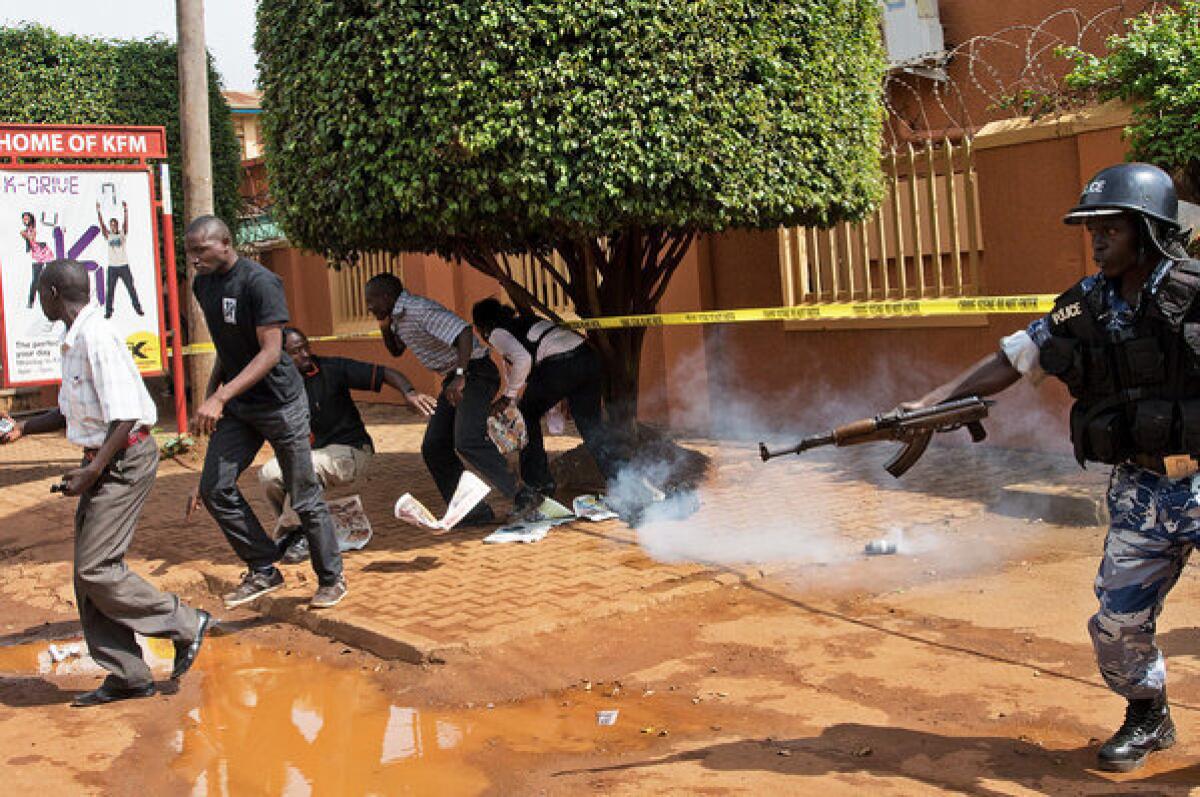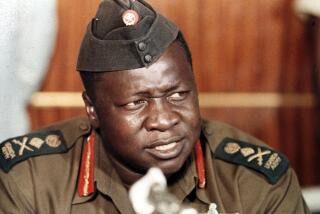Ugandan government claims victory in standoff with press

- Share via
JOHANNESBURG, South Africa -- What happens when the president doesn’t like what the media say?
Uganda just found that out, when two newspapers that published a letter from a general attacking President Yoweri Museveni’s increasingly autocratic leadership style were closed down for 10 days, declared “crime scenes,” raided by police and pressed to reveal the story’s source. On Wednesday, journalists who protested were tear-gassed.
Rumors swirled that the government would keep the Daily Monitor, widely seen as a serious daily newspaper, and its more sensationalist rival Red Pepper closed until they went bankrupt, Ugandan journalists said in phone interviews Thursday, describing an atmosphere of fear and intimidation.
Two sister radio stations to the Monitor -- KFM and Dembe FM --were also shut down.
When Museveni came to power in 1986, he was seen in the West as one of a new breed of forward-looking African leaders who would replace the “big men” who clung to power for decades. He even wrote in 1986 that “the problem of Africa in general and Uganda in particular is not the people, but leaders who want to overstay in power.”
Instead, he turned into one of those leaders. The government removed constitutional limits on presidential terms in 2005, sparking speculation that Museveni wanted to be president for life.
Opposition leaders have been beaten, jailed, harassed and threatened, while protests and activist groups have been banned. Media have come under increasing pressure.
The government Thursday declared victory in its battle with the newspapers after a meeting with the papers’ managements. Interior Minister Hillary Onek claimed the Daily Monitor’s management said it regretted what it had published and promised only to run factual, properly checked stories that did not affect the country’s security. Both newspapers and both radio stations were allowed to reopen Thursday.
But the head of the Nairobi-based Nation media group, which owns the Daily Monitor, said the newspaper stood by its work and had never expressed regret to government officials.
“We regretted the situation was obtained as a result of this. We did not regret the article,” Linus Gitahi, the Nation chief, said in a phone interview from Kampala, Uganda. “In fact, it is one of the articles that we thought was well done and the journalist stands by his story.”
The letter by Gen. David Sejusa, head of Ugandan intelligence, alleged that Museveni was maneuvering to install his son, army Brig. Gen. Muhoozi Kainerugaba, as his successor after the president finally retires. Sejusa’s letter to one of his subordinates also asked that the intelligence service investigate a plot by Kainerugaba’s allies to assassinate several top generals opposed to Kainerugaba becoming the next president.
The police raids on the newspaper officers were carried out to search for a copy of Sejusa’s letter.
Sejusa is in exile in Britain and issued a statement Wednesday accusing Museveni of refusing to let army generals retire, so as to prevent them from mounting political challenges. Sejusa, who is under investigation for misconduct, Wednesday tried unsuccessfully to resign from the military. Under Ugandan law, military officials are not allowed to run for political office.
Anyone rumored to harbor political ambitions was threatened with military prosecution, Sejusa said.
“I refuse to succumb to perpetual abuse. You must set us free and set my suffering comrades free or we shall free ourselves,” Sejusa said in the statement.
Museveni fast-tracked Kainerugaba, 39, through the military ranks, promoting him to brigadier general in August. Kainerugaba is in charge of the elite unit that guards Museveni and key installations such as oil fields.
Kampala Mayor Elias Lukwago, an opponent of the president, last week called him Uganda’s “big brother” in an interview with local newspaper the Observer.
“The president behaves like the big brother in the country and he wants to kill all institutions. That is why he is always interested in being in control of everything,” Lukwago said. “You see, that is typical of a banana republic and in my view this country is on the verge of being declared a failed state. And, so, in that situation, dictatorship becomes inevitable.”
Richard Wanambwa, co-author of a story that accompanied Sejusa’s letter in the Daily Monitor, said in a phone interview that journalists and management had feared that the government would keep the newspaper closed until it went broke.
“I’m told that the authorities are planning to move in and target my home. I’m told that they may be preparing to prosecute me as an individual,” Wanambwa said. He said he was being intimidated and followed by government spies.
“My vehicles have been surrounded by government spies,” he said. “They have been following me. I went into hiding. I don’t drive anymore. I use public transport.”
Ugandan army officials have denied there is any plan to install Kainerugaba as president.
ALSO:
Hurricane Barbara strikes Mexico’s Pacific Coast; two dead
Syria has received advanced missiles from Russia, Assad says
Global Voices: Channeling ‘comfort women’ amid new controversy
More to Read
Sign up for Essential California
The most important California stories and recommendations in your inbox every morning.
You may occasionally receive promotional content from the Los Angeles Times.













